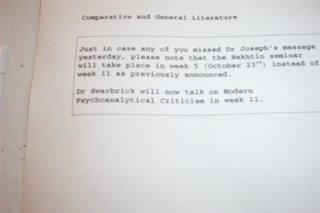
I have included, to the left of all this nonsense, several links to a variety of pages of present interest or necessity to me. There you will find a link to my sister's wedding blog, the premier website on Marx, and a variety of other things (more to come, of course). The Marx, Hume, Pitkin, and Locke sites all link to essays that I am presently reading or rereading for my academic pursuits. Here are some questions I have to consider for next Wednesday's course.
1. Try to extract the central ideas from Adorno and Horkheimer. What version or versions of the enlightenment project are described here?
2. Compare Defoe’s story to Locke’s second treatise. Within a few pages Defoe says both that he was “reduced to a mere state of nature” and that “I might call my self King, or Emperor over the whole Country”. What are the politics of Crusoe’s island? Think especially about his relation to Friday, of course.
Doesn't that just sound exciting?
nerd alert
ReplyDeletemy head hurts just from reading the questions :P
ReplyDeletemaybe i'll just stay at Sylvan and Fleming's and not go back to grad school :P
MIss you so much!
Oh, Second Jess, be not concerned at your ability to manuever the great Mind of academia. Nobody knows what they're talking about, and we are all fearful students. It only takes time to learn familiarity. Take heart!
ReplyDeleteMy apologies - I just do not have the brain power to even read those question.
ReplyDeleteYour graduate program is way more intense than mine. Perhaps it is because yours is in Scotland and mine is just in Ventura...